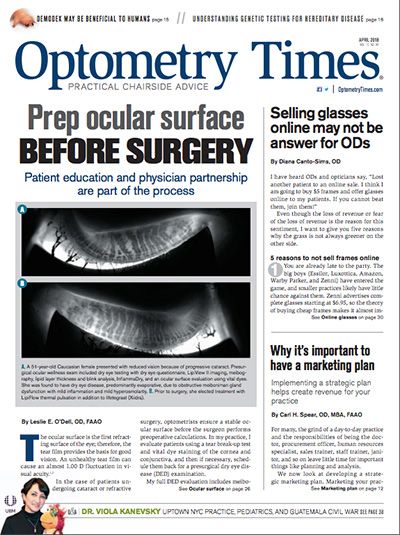Selling glasses online may not be answer for ODs
Even though the loss of revenue or fear of the loss of revenue is the reason ODs wish at times to join online glasses sales, consider five reasons why online glasses sales may not be in the best interest of the OD.


I have heard doctors and opticians say, “Lost another patient to an online sale. I think I am going to buy $5 frames and offer glasses online to my patients. If you cannot beat them, join them!”
Even though the loss of revenue or fear of the loss of revenue is the reason for this sentiment, I want to give you five reasons why the grass is not always greener on the other side.
5 reasons to not sell frames online
1. You are already late to the party. The big boys (Essilor, Luxottica, Amazon, Warby Parker, and Zenni) have entered the game, and smaller practices likely have little chance against them. Zenni advertises complete glasses starting at $6.95, so the theory of buying cheap frames makes it almost impossible to compete on price.
2. Generally, you cannot provide quality and inexpensive price at the same time.
3. If you care about quality and patient care, the best way for your patients to receive glasses that fit properly is not online.
Previously from Dr. Canto-Sims: 6 tips to address, survive one-star online reviews
4. It’s not as cheap as you think. Determine the cost of starting, designing, and maintaining an e-commerce website along with the logistics to make, pack, and ship out glasses.
5. Online pioneers like Warby Parker are currently opening brick and mortar optical stores across the nation.
Dave Gilboa, co-founder and co-CEO of Warby Parker, in an interview with Diane Lincoln Estes on PBS.com said, “We found that there’s still a lot of demand for people walking into physical stores, and now we have 55 stores. We will open about 25 more. There are certain customers that probably will never feel comfortable buying glasses online, and so those customers wouldn’t shop with us unless we had physical stores.”1
Even the online pioneers see the importance of offering the services you already offer that cannot be provided online.
How do we retain these sales? Every practice likely loses a percentage of patients to online sales (some people value convenience and cost over quality and service). Patients are bombarded with advertisements on television, reading emails, or by pop-ups on the sidebar re-targeting them specifically.
Dos and don’ts of selling your value
You and your staff can explain, inform, and educate patients about what they can expect from your practice vs. what they may expect elsewhere. Purchasing eyeglasses online requires compromise in many areas where ODs are committed to quality, fit, and a great patient experience.
Here are dos and don'ts to follow to help patients understand your value:
1. Do raise awareness. Show your patient the facts. The American Optometric Association (AOA) has an informational PDF that takes a closer look at ordering glasses online.2 A good deal does not mean that you are getting the same quality. A study found that about half of online glasses ordered came with the wrong prescription or other problems.3
This AOA information sheet describes a study in which 200 pairs of eyeglasses for adults and children were ordered from 10 of the most popular online optical vendors. Of the 200 pairs ordered, only 154 pairs were received. Of the pairs delivered, 44.8 percent had incorrect prescriptions or safety concerns.3
That is a 1-in-4 chance the patient will not get the glasses he ordered, and 1-in-2 that if he does get them, the glasses will not be what the patient ordered, not be the correct prescription, or even may be dangerous to wear. We must inform the patient that an incorrect prescription can cause blurred vision or discomfort, and lenses that do not meet federal safety standards can shatter and may cause injury.
Related: Respect patients' trust during eyewear selection
Explain to patients that convenience may mean compromise. “Available at the click of a button” or “lowest price” doesn’t always mean “best fit” or “best value.” I recommend to patients that they not compromise for a low price because their ocular health and safety is not worth it.
2. Do explain quality. Some patients are unaware that ill-fitting glasses can make the difference in learning, working, and functioning at our best. Poor quality lenses can impact our vision or jeopardize our safety.
If the patient is not convinced, I suggest reviewing the most notable downsides of purchasing online:
• Patients are not able to try on the glasses or obtain in-person assistance from an optician or trained sales associate.
• Every pair of glasses needs micro-adjustments that can be made only in-person with a skilled professional. Glasses are a custom-made item.
• Specific measurements are needed to purchase eyeglasses, such as pupillary distance (PD). This measurement can be taken only by a trained professional.
3. Do present your value. We all know that the computer cannot adjust anyone’s glasses. Explaining to your patients the importance of style, fit, face-to-face personal interaction, and the ability to adjust the frame is key. Until the Internet can figure out how to laser beam an optician through Wi-Fi, patients can get this only from you.
4. Do promote specialty services. Promote your “same-day service” or “glasses in one hour.” This is one service that online retailers cannot provide your patient.
In this era of “microwave mentality,” glasses made same day will always win over ordering online and waiting for delivery.
5. Don’t feel responsible for all. Unless glasses were dispensed by you, don't take any responsibility for adjustments, screws, nose pads, or repairs. If you do, you are encouraging patients to shop elsewhere or online.
You facilitate and encourage patients’ online purchases when you adjust or repair eyewear purchased online using your expertise. Patients will think they can buy cheap glasses online because you are there to adjust, fix, or repair them.
If you are considering charging a small fee, you will under-value your expertise. Even if you charge $50 or $100, some online companies reimburse patients up to $50 for adjustments.
6. Don’t take it to heart. You cannot be all things to all people. Some people value convenience and cost over quality and service. This is their choice. It does not matter what you tell them, they will always think buying glasses online is the best thing.
As an OD who prides myself in providing the best quality and fit to my patients, I am unwilling to compromise when it comes to discount eyewear, and neither should you.
References
1. Lincoln Estes D. Warby Parker’s CEO on how to thrive in retail as big-box stores are dying. PBS NewsHour. August 17, 2017. Available at: https://www.pbs.org/newshour/economy/warby-parkers-ceo-thrive-retail-big-box-stores-dying. Accessed 3/20/18.
2. American Optometric Association. A Closer Look at ordering Eyeglasses Online. Available at: https://www.aoa.org/documents/public/A_Closer_Look_at_Ordering_Eyeglasses_Online.pdf. Accessed 3/20/18.
3. American Optometric Association. Let the Buyer Beware: A Closer Look at Ordering Eyeglasses Online. August 7, 2014. Available at: https://www.aoa.org/newsroom/let-the-buyer-beware-a-closer-look-at-ordering-eyeglasses-online. Accessed 3/20/18.
Newsletter
Want more insights like this? Subscribe to Optometry Times and get clinical pearls and practice tips delivered straight to your inbox.
